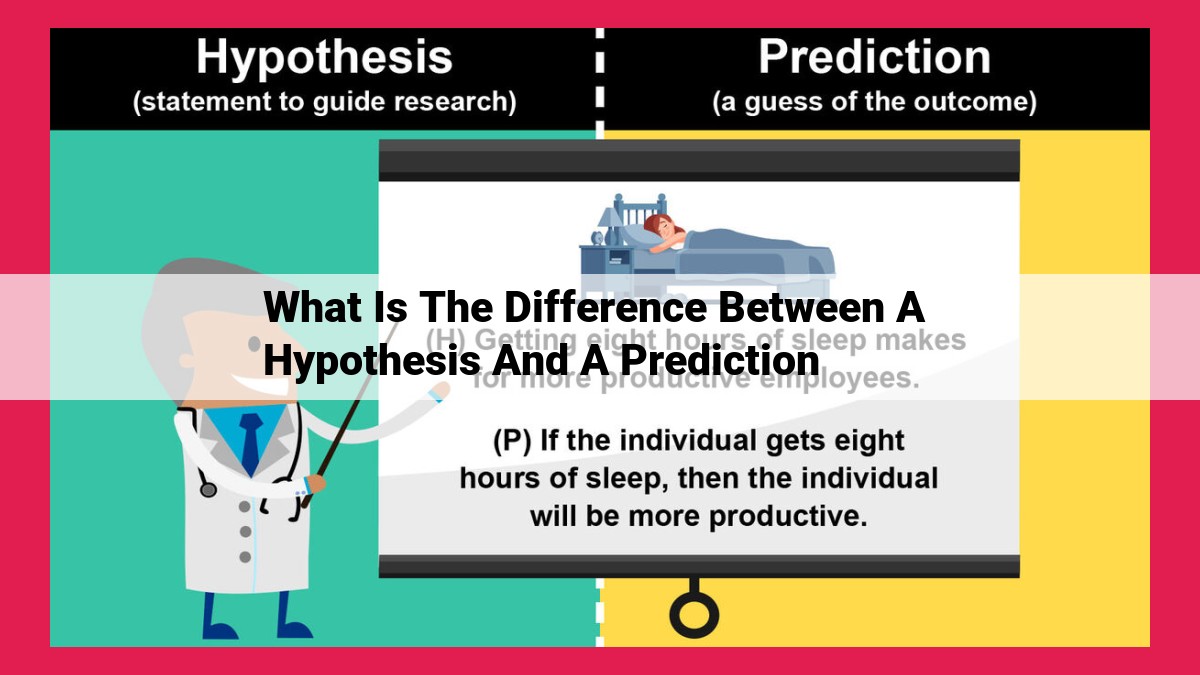Unveiling The Interplay Between Hypotheses And Predictions: Key To Advancing Scientific Knowledge

A hypothesis is a tentative explanation for an observation or phenomenon, while a prediction is an expected outcome based on the hypothesis. Hypotheses guide scientific investigations, providing a framework for making predictions that can be tested and analyzed. Predictions are specific statements about what will happen if the hypothesis is correct, allowing scientists to gather evidence and support or refute the hypothesis. The relationship between hypotheses and predictions is crucial for advancing scientific knowledge as they work together to validate theories and drive further exploration.
Understanding Hypotheses and Predictions: The Cornerstones of Scientific Inquiry
In the realm of scientific investigation, hypotheses and predictions hold immense importance. They serve as essential tools for researchers to delve into the unknown, uncover truths, and advance our understanding of the world around us.
A hypothesis is a tentative explanation, an educated guess based on existing evidence. It proposes a possible solution to a scientific problem or question. A prediction, on the other hand, is a specific, testable statement about an expected outcome based on the hypothesis. Predictions are designed to verify or refute the hypothesis through empirical evidence.
The distinction between these concepts is often subtle but crucial. A hypothesis is a broad, general statement, while a prediction is a narrow, specific assertion that can be directly tested. Hypotheses guide the research process, providing a roadmap for investigations, while predictions serve as milestones along the way, allowing researchers to assess the validity of their hypotheses.
Together, hypotheses and predictions form the foundation of scientific inquiry. They drive the iterative cycle of hypothesis formulation, prediction, experimentation, and data analysis, which leads to the gradual accumulation of knowledge and the advancement of scientific understanding.
Hypothesis: A Tentative Explanation – Unveiling the Cornerstones of Scientific Inquiry
In the realm of scientific exploration, hypotheses reign supreme as tentative explanations that guide our understanding of the world around us. They are the linchpins of scientific research, providing a framework for further investigation and experimentation.
A hypothesis emerges from the depths of our observations and existing knowledge, offering a plausible explanation for a phenomenon. It is not a set-in-stone truth but rather a working idea that seeks to account for the evidence we have gathered. This tentative nature allows for revision and refinement as new information emerges.
The primary purpose of a hypothesis is to guide further investigation. It provides a roadmap for researchers, directing their experiments and observations towards specific aspects of the phenomenon under examination. By formulating a hypothesis, scientists establish a clear direction for their research, ensuring that their efforts are focused and efficient.
Related concepts that intertwine with hypotheses include theories, evidence, and tests. A theory is a well-established explanation for a broad range of phenomena, while a hypothesis is a specific prediction derived from a theory. Evidence supports or refutes hypotheses, and tests are designed to gather this evidence and evaluate the validity of the hypotheses. This interplay between hypotheses, evidence, and tests forms the cornerstone of the scientific method.
Prediction: A Specific Expected Outcome
In the realm of scientific inquiry, predictions play a pivotal role in testing the validity of hypotheses. Unlike hypotheses, which serve as tentative explanations based on evidence, predictions are specific statements about anticipated outcomes. They act as measuring sticks against which the validity of hypotheses can be assessed.
Predictions are derived from hypotheses and are carefully formulated to provide a concrete way to evaluate whether or not the hypothesis holds true. By comparing the predicted outcome with the actual results of an experiment or observation, scientists can determine the accuracy of their hypothesis.
Predictions, as the name suggests, are inherently specific. They state a measurable outcome that can be tested through evidence gathered from experimentation or observation. This Measurable nature is crucial as it allows scientists to quantify and compare the results with the predicted outcome, thereby providing a basis for evaluating the hypothesis.
For instance, if a hypothesis proposes that plants exposed to higher levels of sunlight will grow taller, the corresponding prediction could be that the average height of plants in a high-sunlight group will be significantly greater than that of plants in a low-sunlight group. This specific prediction allows researchers to design an experiment that directly tests the hypothesis and provides tangible evidence to support or refute it.
In summary, predictions are indispensable tools in the scientific process. They provide a specific and measurable way to evaluate the validity of hypotheses, guiding scientists in the iterative cycle of formulating hypotheses, making predictions, conducting tests, and gathering evidence. Understanding the role and significance of predictions is essential for evaluating scientific research and making informed decisions based on evidence.
The Relationship between Hypotheses and Predictions
In the scientific realm, hypotheses and predictions form a symbiotic relationship, inextricably linked in the quest for knowledge. A hypothesis serves as a tentative explanation, a beacon guiding scientific inquiry. Predictions, on the other hand, are specific statements that emerge from hypotheses, providing a tangible way to assess their validity.
Consider the iterative cycle that underpins scientific research. A hypothesis, forged from existing evidence and scientific reasoning, proposes a potential explanation for an observed phenomenon. From this hypothesis, researchers deduce predictions, specific outcomes that should occur if the hypothesis holds true. These predictions are then subjected to rigorous testing through experiments or observations.
The testing phase is crucial in evaluating the hypothesis. If the predictions align with the experimental results, the hypothesis gains support. Conversely, if the predictions are disproven, the hypothesis may require revision or even rejection. This iterative process of formulating hypotheses, making predictions, and conducting tests is the lifeblood of scientific inquiry, gradually refining our understanding of the natural world.
Through this iterative cycle, scientists accumulate evidence either supporting or refuting hypotheses. Over time, well-supported hypotheses may evolve into scientific theories, robust explanations that have withstood extensive testing and provide a comprehensive framework for understanding a particular aspect of the world.